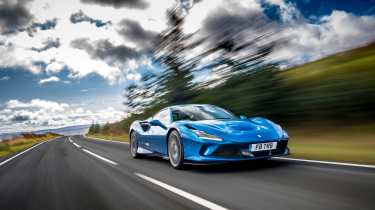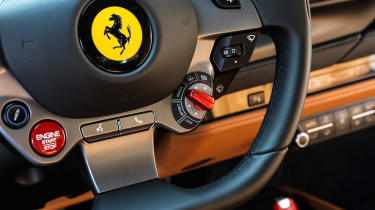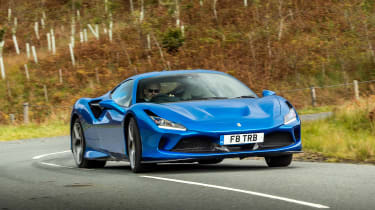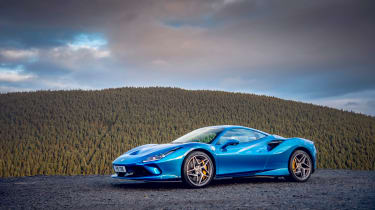Ferrari F8 Tributo (2019 – 2023) review – the last pure petrol mid-engined Ferrari
The last non-hybrid mid-engined Ferrari supercar was a triumph, even after the 488 Pista. The V8 went out on a high
The Ferrari F8 Tributo was named for its legendary 3.9-litre V8 engine. It was a name that, when new, seemed to hint at the end of an era for Ferrari. As it transpired, that V8 went on to serve, in differing states of performance and aggression, in the Roma GT and two versions of the SF90 hybrid supercar. But it was still a stepping off point. The Roma brought a new, cleaner styling direction, while the SF90 brought such an incredible technological focus. Then the 296 GTB arrived, to end definitively a decades-long run of V8s in Ferrari’s mid-tier mid-engined supercars. You could then, let alone now, be forgiven for thinking that the F8 was a little old hat.
But to those of this aberration, we say there’s nothing wrong with that, as the F8 Tributo buillt on one of Ferrari’s all-time great architectures, with a handsome look featuring styling details that reference previous V8 models, improved steering feel and engine noise, and (pretty much) the 488 Pista’s 710bhp engine. Looking back, it’s also seemingly, Ferrari’s last pure combustion production mid-engined supercar.
Engine, gearbox and technical highlights
The 3.9-litre twin-turbo V8 in the back of the F8 wasn’t quite the Pista unit. Mostly so, from its lightweight internals – titanium rods, lighter crank and flywheel – to its higher lift cams and shorter inlet tracts. The differences stem from the fitment of an emissions kit, specifically GPFs (Gas Particulate Filters) that increase back pressure, but Ferrari worked around this to deliver Pista-matching power and torque – 710bhp at 8000rpm and 568lb ft – and cleaner emissions.
More reviews
The F8 lost 40kg compared to the old 488 GTB – it featured a minimum kerb weight of 1435kg – thanks in part to the Pista engine, which was 18kg lighter than the GTB’s, and partly due to optional carbonfibre wheels that accounted for another 10kg. The F8 also incorporated the aero tricks of the Pista to help deliver more downforce for less drag and to manage the intake air to help generate Pista power. This included moving the engine air intakes from the side pods to just ahead of the rear spoiler.
Dynamically, the F8 used 488 GTB spring and anti-roll bar rates for comfort, combined with adaptive damping that gives some of the Pista’s roll control. So the F8 wasn’t as focused a model as the Pista, but to help customers exploit over 700bhp, Ferrari evolved its Side Slip Control (SSC) and added Ferrari Dynamic Enhancer Plus (FDE+) with the objective of making the F8 easier to handle at the limit.
Performance and 0-62 time
Early driving impressions are dominated initially by the performance. Despite carrying 50kg more than the Pista, the F8’s performance was virtually the same: 0-62mph in 2.9sec, 0-124mph in a sensational 7.6sec, and 211mph all out.
Then, by a couple of other attributes, one being the steering, which is heftier than in the 488 GTB but also has more feedback for a better connection feel. The second is the noise. The GPFs fitted for emissions have the effect of reducing the tailpipe noise, so Ferrari developed an in-exhaust resonator that enhances engine noise and feeds it to the cockpit. And it works. There’s a rich, flat-plane-crank V8 character right through the rev range, something lacking in the GTB and the Pista.
Ride and handling
Ferrari also managed to maje a 710bhp, mid-engined Ferrari exploitable at the limit. The company is very good at delivering distinctly different drive modes via the steering-wheel-mounted manettino switch, altering dynamic parameters for cohesive, distinct modes. So when it says it can give the F8 driver support that will reduce the wheel workload at the limit, you’re inclined to believe it.
The Fiorano circuit should have been the place to demonstrate this, but in fact it was inconclusive. What was apparent was that the F8 is indeed a softer, slightly less focused car than the Pista but a usefully well-balanced and predictable one. The track F8s were fitted with Michelin Cup 2s, which, according to Ferrari’s test driver, can get the F8 to within half a second of the Pista’s lap time.
Most F8s are fitted with regular Pirelli P Zeros, however. As specified, the ride is firm but nicely rounded and there’s a good connection feel with the car through the steering. On smooth and open roads, SSC 6.1 and FDE+ showed their value. They work in two modes, Race and CT Off and – as claimed – they help make oversteer moments smooth and calm. It’s uncanny; you need to apply the opposite lock to correct the slide, but it all feels clean and easy. Of course, you don’t need to drive the F8 that hard to enjoy it. It’s a refined, comfortable cruiser, too, the engine note dropping to a murmur.
Interior and tech
The F8 Tributo’s cabin was a moment of rationalisation in the modern history of Ferrari’s mid-engined V8s. Following the slightly mad ergonomics of the 458 and 488 but pre-dating the haptic nightmare of the 296 GTB, the F8’s is a cabin that, when compared with those of its bloodline, almost makes sense.
There are still plenty of angular elements but the vents are circular and where you’d expect to find them. The updated wheel first seen on the 812 (not the haptic wheel, thank goodness) is still littered with buttons and controls, but the rest of the cabin’s buttons are something we can now be thankful for knowing what was to come with the 296. It’s from an era when quality was up, too. All controls and touch points are tactile in feel, the stitching and shut lines are millimetric.
Tech-wise, the F8 Tributo could be had with the pricey passenger display and equally pricey Apple CarPlay. This from that period of time when Ferrari charged a few thousand quid for something that should have been – and eventually was made – free.
evo Car of the Year 2020 verdict – Stuart Gallagher
‘‘There are moments of magic in the Ferrari F8 Tributo… The way it lets you drive it down a road, you get out thinking it is the best car in this test.’ Henry Catchpole’s sentiment could have been applied to any of our eight eCoty 2020 finalists, but it feels a fitting remark for the wonderful F8.
And it is wonderful. It bristles with the character that is lacking in the 488 Pista and has the performance to match the McLaren 765LT, albeit delivered in a more cultured way. The edginess of its optional Michelin Cup 2 tyres lost it a point or two from all the judges and the carbon-ceramic brakes proved hard to modulate, and while it matched the 765LT for punch, its V8 lacks a voice. As Jethro pointed out:
‘On the right road and in the right conditions, the F8 is genuinely brilliant. However, the instant steering response, abundance of torque and the rather sharp edges of the Cup 2 tyres don’t quite deliver in Scotland.’ From Dickie there was admiration for Ferrari’s approach to modern supercars: ‘They understand how to build a state-of-the-art mid-engined supercar like Rolex understands watchmaking.’’
Ferrari F8 Tributo values, rivals and successor
The list price of the F8 Tributo was £203,476, which was about £20k more than the 488 GTB it replaced but £50k less than the track special Pista. It was also £5k less than its chief rival, the McLaren 720S. That’s far from the case a few years on, with F8 prices holding firm by comparison to both the McLaren 720S and Ferrari 296 GTB that succeeded the F8. You’ll pay no less than £200k for an F8 at the time of writing (March 2025), compared to 720s which start from £110k and amazingly, 296s, which start from £190k. Perhaps owners and the market value the F8’s comparative simplicity, though it is folding money more also than its predecessor, the 488. Those hefty service plans and warranties modern Ferraris have, that many 488s will be out of now, are probably of a benefit to values, too.
The Pista remains the more direct and focused driver’s car than the F8, but as a 488 Pista replacement, it really was quite something. Not because it was more potent, that’s almost a side issue, but because it’s comfortable and refined like the GTB and then adds weightier, more connected steering and an appealing engine note that’s there from tickover to red line. Together, they help make the F8 a more engaging and rewarding car. As the last of the pre-hybrid, mid-engined V8s, it’s a great high to go out on.











